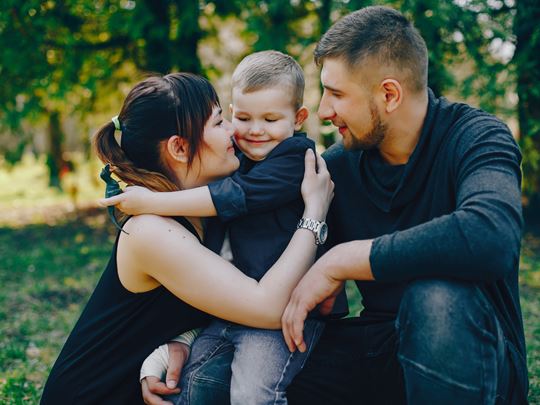
Fostering can be incredibly beneficial to your own children.
It can teach them to share, understand diversity, and develop empathy. These essential life lessons will not only help them build long-lasting relationships in the future but will also support their character development.
However, when a new child moves into your home, your child may develop complex feelings about sharing their parents with their new sibling, which may result in jealousy.
Join us as we explore the causes of sibling jealousy and the steps you can take to ensure every child in your home feels content, valued and loved.
What causes sibling jealousy?
Imagine you’re a child who has always known the same comforting routine with your parents – a routine that makes you feel safe, secure and loved. This routine may include daily moments of individual attention, like cooking together or discussing your day over dinner. These moments may have become cherished parts of everyday life filled with connection and one-on-one attention, even if you don’t fully realise it.
But then, a new child enters the home, and suddenly, that routine you’ve come to rely on begins to shift. The moments you once had all to yourself now have to be shared, and the sense of stability you’ve always felt starts to feel uncertain. You may begin to feel jealous of your new sibling and find yourself competing for your parents’ attention because you miss the routine you used to have.
So, your children will need your support to navigate this change in family dynamics and to reassure them that, even with a new sibling, your love for them hasn't altered.
Managing sibling jealousy
Sibling jealousy can create tension, and with the outside world already full of competition, the home should be a sanctuary where you can relax and not worry about competing with others. For the child you foster, who has already experienced the upheaval of moving into care, it could also make them feel unwelcome and unwanted.
Therefore, sibling jealousy needs to be taken seriously and managed, so that both your child and the child you foster feel safe, stable and happy at home. Here are some tips to help you manage sibling jealousy.
Validate their feelings
When a new child moves into your home, it’s important to regularly check in with your child to see how they’re adjusting to the change. Even if they don’t openly express jealousy toward their new sibling, they may show it in other ways. Depending on their age, they might show big feelings, refuse to share, withdraw or experience changes in their eating and sleeping habits. It’s crucial to look beyond their behaviour and recognise that this change may be unsettling for them, and experiencing some jealousy is normal.
Talk to your child when they’re calm in a quiet and comfortable place free from distractions. They may find it easier to open up while engaged in another activity with you, such as playing with toys, cooking, or on a walk. Acknowledge their feelings by letting them know you understand this transition might be difficult, reminding them that your love for them remains the same.
You could also consider talking about the child you’re fostering to help them understand the situation better and develop empathy for them. For instance, you could explain that the child can’t live with their family right now and that you’re trying to make your home feel like theirs.
Spend quality time with them
Your child may feel a sense of loss when thinking about how their life used to be and may miss the quality time spent with you. This could be especially true if the quality time you used to share now also involves the child you’re fostering. For example, if you used to have meaningful conversations with your child on the drive to school, these conversations may now include their new sibling, too.
To help your child with this transition, try to allocate one-on-one time with them. As you develop your new routine, incorporate as many of the special moments you used to share before their sibling moved in as possible. For example, if you’ve always tucked your child in at bedtime and read them a story, continue this nightly tradition.
You could also organise fun activities, such as a ‘parent and child’ day out. Not only will you both appreciate this special time together, but your child will enjoy planning the activity and look forward to spending quality time with you. Make sure you also incorporate quality moments with the child you're fostering so they feel part of the family and have an opportunity to bond with you.
Nurture their Individuality
When a new sibling arrives, your child may compare themselves to them. For example, if the child you’re fostering is a promising artist but your child doesn’t have an interest in art or feels they aren’t as skilled as their sibling, jealousy may arise. Every child has different personalities, interests, and strengths. It’s important to nurture each child’s individuality and help them explore their own interests so they can discover what they enjoy and excel at.
Try to be consistent with your praise, and if you encourage one child to pursue an interest, be sure to do the same for the other. If your child feels jealous of a particular skill the child you’re fostering has, reassure them that everyone is unique and can make their own impactful contribution to the world.
You could also encourage the children to teach each other their skills. For instance, if your child is good at making friends but the child you’re fostering struggles with this due to their past experiences, you could ask your child to help them. This shows that you recognise their strengths and could help nurture a bond between the siblings.
Help them build a relationship with their sibling
Building a relationship with their sibling could help your child feel less competitive. It will also help your child to gain a better and more compassionate understanding of their sibling’s experiences, feelings and needs. This is especially crucial if the child you’re fostering requires more attention due to their specific needs, as your child may feel pushed out.
Encourage the children to spend some one-on-one time together. For example, you could ask them to choose a recipe and cook a meal for the family together. This type of activity encourages conversation and teamwork, both of which can help strengthen their bond. It also provides an opportunity for them to communicate in a relaxed setting, making the conversation feel less intense.
Encourage healthy coping strategies
If your child struggles to cope with jealousy, they may act out in ways that impact the whole family. You can support your child by encouraging them to develop healthy coping strategies to manage their feelings. This could include outlets for their emotions, such as journaling, painting or engaging in a hobby they enjoy.
You can also support them by helping them build a positive self-image. For example, sit with them and write down their strengths and the personality traits you both love that make them who they are. They can then refer to this later if they feel jealous. You could also leave them special notes in their lunchbox or bedroom to remind them that you love them and that this will never change.
You could additionally encourage them to speak to other children who foster. At Orange Grove, we offer support groups specifically for children who foster, providing a safe place for them to share their thoughts and feelings with young people from similar family setups. They may find comfort in knowing that other children feel the way they do, and it could help them build friendships with children who truly understand where they're coming from.
Seek further support
Here at Orange Grove, we support your whole family through every stage of the fostering journey. We understand that it takes a village to raise a child, so we surround you with a community of tailored support that you can tap into whenever needed.
From resources, support groups and a helpline for children who foster, to training on child behaviour and family support workers who focus on the well-being of your entire family, we’ll work with you to create a stable, supportive and nurturing environment where everyone can thrive.
As well as supporting children in foster families, you’ll have a community of fostering professionals to lean on, including access to a therapist whenever needed. Our foster parent support groups also allow you to connect with other foster parents, share experiences and build friendships.
If you already foster with us and need further advice on managing sibling jealousy, talk to your supervising social worker. They can provide guidance and help you access additional support. Talking to other foster parents could also be helpful; they may be able to offer practical advice based on their experiences.

Get in touch today
If you’re considering becoming a foster parent and are concerned about the impact it could have on your children, please get in touch. Our friendly team will be happy to provide more information and answer any questions you may have.
Together, we can transform young lives and make fostering a rewarding and positive experience for the whole family.





